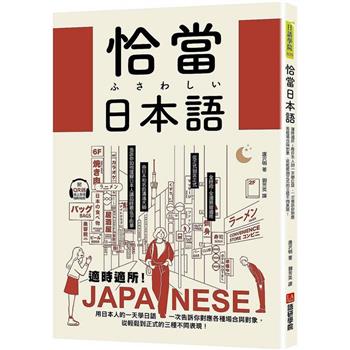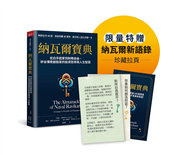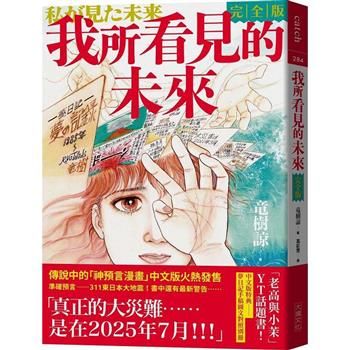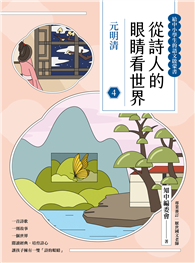常春藤院校馬里蘭大學學院市分校教授 Michele Gelfand 二十年來研究結晶
這麼多生活規則打哪來?我們為什麼遵守又為什麼踰矩?
為何德國製的鐘錶總是分毫不差,但巴西製的鐘錶卻老是出差錯?為何在新加坡賣口香糖會被抓去關?為何紐西蘭女性做愛的次數是其他地方女性的三倍之多?為何兩大汽車巨頭賓士與克萊斯勒合併反而導致鉅額虧損?又為什麼這世代的美國人為孩子取的名字一個比一個還怪?
曾獲許多學術獎項肯定,研究被紐約時報、華盛頓郵報等多次引用的 Michele Gelfand 為了滿足自己對這些問題的好奇心,二十年來潛心研究緊密社會(對於道德準則有嚴謹的規範和詮釋)及鬆散社會(較沒有特定形式或規範的群聚型態)範疇。Michele Gelfand 與政治學家、神經科學家、電腦科學家、人類學家和考古學家合作,研究超過五十個國家的社會狀態,得出一項令人喜出望外的結論:人類的危機意識會大大影響我們的行為走向。所以有些國家會傾向與其他國家保持緊密關係,部分美國人被貼上社會主義標籤,而另一部分人被貼上資本主義標籤,而那些參加運動比賽、健康社團或學校活動的人也多有固定的行為模式。
Michele Gelfand 以簡明的文字讓我們輕易理解,有些領導者思想新穎、行為創新,有些領導者卻保守守舊的原因,緊密社會與鬆散社會是如何影響人們的一生,更有甚者,各文化裡頭我們以為微不足道的一個小小面相卻是如何深深影響著我們的生活。(文 / 博客來編譯)
Why are clocks in Germany always correct, while those in Brazil are frequently wrong? Why are Singaporeans jailed for selling gum? Why do women in New Zealand have three times the sex of females worldwide? Why was the Daimler-Chrysler merger ill-fated from the start? And why does each generation of Americans give their kids weirder and weirder names?
Curious about the answers to these and other questions, award-winning psychologist Michele Gelfand has spent two decades studying both tight societies (with clearly stated rules and codes of ethics) and loose societies (more informal communities with weak or ambiguous norms). Putting each under the microscope, she conducted research in more than fifty countries and collaborated with political scientists, neuroscientists, computer scientists, anthropologists, and archeologists. Her fascinating conclusion: behavior seems largely dependent on perceived threats. It’s why certain nations seem predisposed to tangle with others; some American states identify as “Red” and others as “Blue”; and those attending a sports contest, health club, or school function behave in prescribed ways.
Rule Makers, Rule Breakers reveals how to predict national variations around the globe, why some leaders innovate and others don’t, and even how a tight vs. loose system can determine happiness. Consistently riveting and always illuminating, Michele Gelfand’s book helps us understand how a single cultural trait dramatically affects even the smallest aspects of our lives.
Michele Gelfand is a Distinguished University Professor of Psychology at the University of Maryland, College Park. Her pioneering research into cultural norms has been cited thousands of times in the press, including in The New York Times, The Washington Post, Harvard Business Review, and Science, and on NPR. The recipient of numerous awards, she is a past president of the International Association for Conflict Management.
| FindBook |
有 1 項符合
Rule Makers, Rule Breakers: How Tight and Loose Cultures Wire Our World的圖書 |
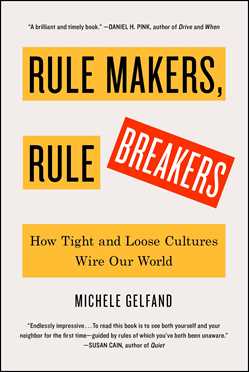 |
Rule Makers, Rule Breakers: How Tight and Loose Cultures Wire Our World 作者:Gelfand Michele 出版社:Scribner 出版日期:2018-09-11 語言:英文 規格:平裝 / 384頁 / 普通級/ 單色印刷 / 初版 |
| 圖書館借閱 |
| 國家圖書館 | 全國圖書書目資訊網 | 國立公共資訊圖書館 | 電子書服務平台 | MetaCat 跨館整合查詢 |
| 臺北市立圖書館 | 新北市立圖書館 | 基隆市公共圖書館 | 桃園市立圖書館 | 新竹縣公共圖書館 |
| 苗栗縣立圖書館 | 臺中市立圖書館 | 彰化縣公共圖書館 | 南投縣文化局 | 雲林縣公共圖書館 |
| 嘉義縣圖書館 | 臺南市立圖書館 | 高雄市立圖書館 | 屏東縣公共圖書館 | 宜蘭縣公共圖書館 |
| 花蓮縣文化局 | 臺東縣文化處 |
|
|
圖書介紹 - 資料來源:博客來 評分:
圖書名稱:Rule Makers, Rule Breakers: How Tight and Loose Cultures Wire Our World
|


